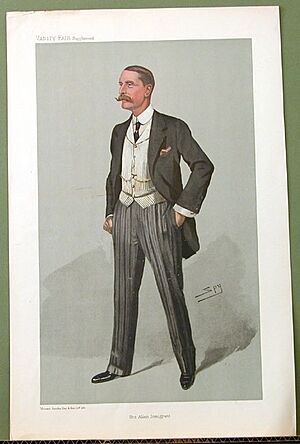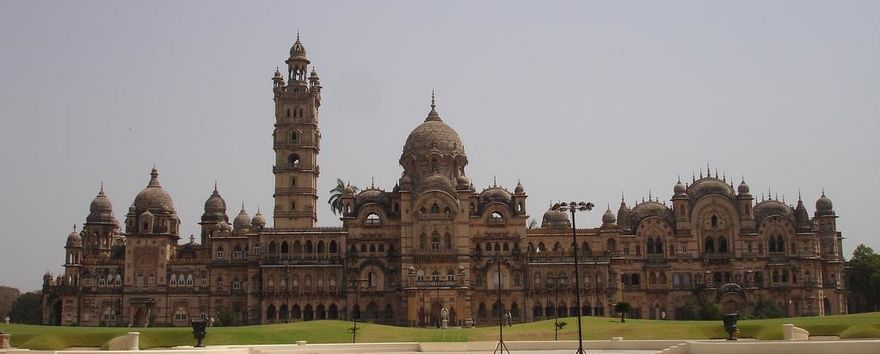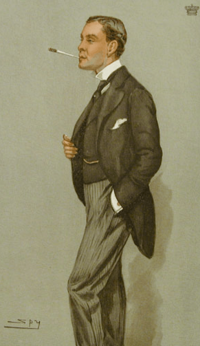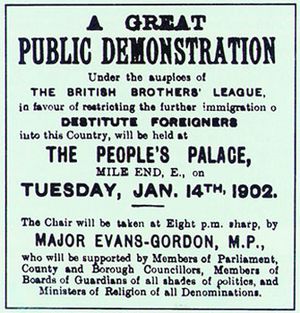William Evans-Gordon facts for kids
Sir William Eden Evans Gordon (born August 8, 1857 – died October 31, 1913) was a British politician and former army officer. He served as a Member of Parliament (MP) in the United Kingdom. Before becoming an MP, he worked as a special officer and diplomat in India for many years.
From 1876 to 1897, he was part of the British Indian Army and worked for the Indian Government's Foreign Department. His job in India involved both military tasks in the busy North-West Frontier area and diplomatic work. He advised Indian rulers, known as maharajas, and traveled with the Viceroy, who was Britain's top official in India.
After leaving the army, Evans Gordon returned to Britain. In 1900, he was elected as a Conservative Party MP for Stepney. He ran on a platform that was against allowing too many immigrants into Britain. At that time, many Jewish people were arriving in Britain from Eastern Europe because of violent attacks against them. Evans Gordon was very active in creating the Aliens Act 1905, a law that aimed to control how many people could enter Britain. He remained the MP for Stepney from 1900 to 1907.
Contents
Early Life and Education
William Eden Evans Gordon was born in Chatham, Kent, England. He was the youngest of seven children. His father, Charles Spalding Evans Gordon, was a Major-General in the army. His mother, Catherine Rose, passed away when he was very young in 1858.
William went to school at Cheltenham College. He then attended the Royal Military College to train as an army officer. He became a Sub-Lieutenant in the army in July 1876.
Military and Diplomatic Work in India
In January 1877, Evans Gordon became a second lieutenant in the 67th Foot regiment. Soon after, he joined the Madras Staff Corps of the Indian Army. He worked with the 41st Madras Native Infantry and later the 8th Madras Native Infantry. From 1881 to 1883, he also served as an assistant to the Governor of Madras. In 1884, he worked with the 1st Regt. Central India Horse.
Between 1885 and 1887, he helped with a joint project between Russia and Britain to mark the border in Afghanistan. He was in charge of translating documents into French and German. He also helped organize all the papers from the Boundary Commission.
From 1884 to 1888, he was an Assistant Secretary to the Viceroy, Lord Dufferin. He traveled with the Viceroy and helped translate during meetings with Indian rulers. In 1886, he joined the Foreign Department of the Indian Government.
In September 1886, he traveled with Sir Mortimer Durand, who was the Foreign Secretary of the Indian Government. They went through the Khyber Pass to a new fort. The Durand Line is still the border between Afghanistan and modern-day Pakistan.
In July 1887, Evans Gordon was promoted to Captain. As a political officer in 1888, he was involved in talks for the surrender of Ghazi Ayub Khan. Ayub Khan had defeated a British army earlier and was seeking safety in Iran. Evans Gordon met him when he arrived in India and escorted him to Rawalpindi.
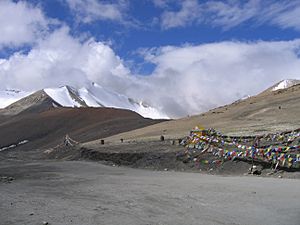
In 1889, he was appointed Joint-Commissioner in Ladakh, a region known for its high mountains. He was described as an "energetic and able officer." In November 1890, he became Assistant Resident in Jammu and Kashmir. During his breaks from India, he traveled in many parts of the East and even went into Tibet in 1891. He once rode a horse 250 miles from Leh to Srinagar in just 33 hours, crossing three high mountain passes in the Himalayas.
In 1894, he traveled to Europe with the Maharaja of Baroda, Sayajirao Gaekwad III. In March 1895, he became the Political Resident in Jhalawar State. He was promoted to Major in July 1896.
In 1896, he was involved in removing the ruler of Jhalawar, Rana Zalim Singh. Some people in Parliament criticized him for this, but the Secretary of State said he had acted wisely.
He retired from the army in May 1897. In 1900, he was awarded the Legion of Honour, a French award. The Times of India Illustrated Weekly reported in 1906 that he had "won the trust and esteem of all the chiefs and magistrates" he worked with in India.
Political Career in Britain
Immigration Concerns in Stepney
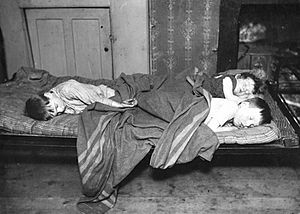
The Stepney area of London was one of the poorest parts of the city. In the late 1800s and early 1900s, more people started moving there. Many of these new arrivals were Jewish people escaping violent attacks in the Russian Empire. As early as 1889, a government committee had noted that there was more poverty in the East End of London because immigrants were taking jobs from English workers.
Some politicians tried to pass laws to control immigration. In 1894, Lord Rosebery suggested a bill in the House of Lords, but it was not passed. The idea of limiting immigration became an important topic in the general elections of 1892 and 1895. The Earl of Hardwicke proposed a similar bill in 1898. That same year, after Evans Gordon had left the army, there was a special election in Stepney. Evans Gordon ran as the Conservative candidate but lost by a small number of votes.
MP for Stepney and the Aliens Act
Evans Gordon was elected as the MP for Stepney in the 1900 general election. He won by promising to limit immigration. He kept his seat until 1907. He was one of the first MPs to speak out strongly against immigration. While many people in Stepney were concerned about immigration, the main issues in the 1900 election were ending the Second Boer War and the question of self-rule for Ireland.
After being elected, Evans Gordon became a key leader behind the British Brothers' League (BBL). This group was formed in Stepney in May 1901 to pressure the government to limit immigration. Evans Gordon was known as one of the loudest critics of immigrants at the time. He warned that "a storm is brewing" that could have "deplorable results" if not addressed.
Evans Gordon and the BBL played a big part in setting up a special government committee called a Royal Commission to study immigration. Evans Gordon was a member of this committee.
He traveled to Eastern Europe for two months to learn about the difficult conditions faced by Jewish people there. He wrote a book called The Alien Immigrant (1903) about his research. The book described the situation of Jewish people and even compared the poor conditions in a city called Libau to the "horrors of the East End" of London.
His book and research were used as evidence for the Aliens Commission. This eventually led to the Aliens Act 1905, which placed limits on immigration from Eastern Europe. However, many people in Parliament were against this bill. Winston Churchill, who was an MP at the time, strongly opposed the Aliens Bill. One-third of his voters were Jewish.
Even though some politicians denied it, the campaign for the Aliens Bill from 1900 to 1905 often included anti-Jewish ideas. Other MPs, like Sir Charles Trevelyan, 3rd Baronet, also defended the refugees from Russia, Romania, and Poland.
Evans Gordon and another MP, Howard Vincent, successfully pushed their party to introduce laws to "keep the foreigner out." Although the Conservative Party managed to pass the Aliens Act, the Liberal Party won a huge election victory in 1906. The new Liberal government did not cancel the Aliens Act, but they did not enforce it very strictly. Evans Gordon kept his seat in the 1906 election and continued to argue for more laws against immigration. He used the slogan "England for the English and Major Gordon for Stepney."
Some people have questioned if Evans Gordon was truly against Jewish people because he supported Zionism, which is the movement to create a Jewish homeland. He regularly wrote to Chaim Weizmann, who later became the first President of Israel. Weizmann wrote that Evans Gordon "had no particular anti-Jewish prejudices" and was willing to help Jews settle in other parts of the British Empire. He just didn't understand why London's poor areas should become like the poor areas of Warsaw. Evans Gordon received a special honor, a knighthood, in 1905.
Other Parliamentary Work
Pilotage Bill 1903
Evans Gordon helped propose the Pilotage Bill in 1903. This bill was about rules for ship pilots. Although the bill was discussed in 1906, it was later withdrawn.
Anglo-French Festival 1905
In 1904, Britain and France celebrated their friendship with the Entente Cordiale. In 1905, Evans Gordon suggested a large joint meeting in Westminster Hall in London as part of the celebrations.
Later Life
On May 1, 1907, Evans Gordon left the House of Commons and retired from politics.
He passed away suddenly on October 31, 1913, at his home in London. A notice about his memorial service appeared in The Times newspaper.
He owned a Thornycroft Phaeton car, which was delivered in 1906. He was also a member of several well-known clubs, including the Carlton Club, Boodle's, Naval & Military, and Orleans.
Family Life
In 1892, Captain William Evans Gordon married Julia Charlotte Sophia Stewart. Julia had been married twice before. Her first husband was the Arthur Hay, 9th Marquess of Tweeddale, and her second was Sir John Rose, 1st Baronet. William and Julia did not have any children together.
Julia's brother was James Stewart-Mackenzie, 1st Baron Seaforth, who was also a military officer. Julia and James also had a sister, Mary Jeune, Baroness St Helier, who was a well-known hostess and politician.
Evans Gordon's siblings included:
- Henry (1842-1909), who was a stockbroker in London.
- Jessica (1852–87), who married Thomas Gibson Bowles, who was also an MP.
His grandfather, Colonel George Evans, served in the Napoleonic wars.
 | William Lucy |
 | Charles Hayes |
 | Cleveland Robinson |


